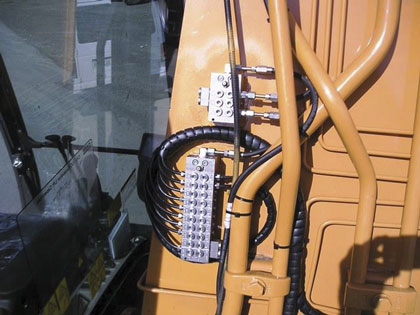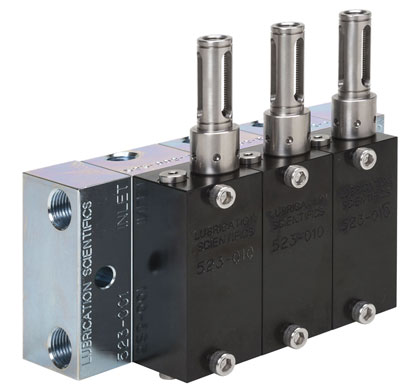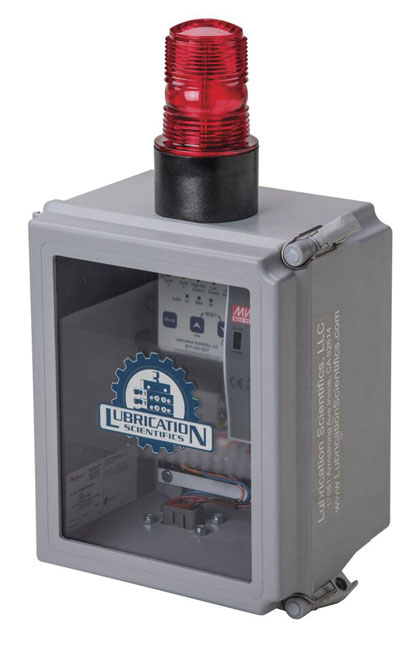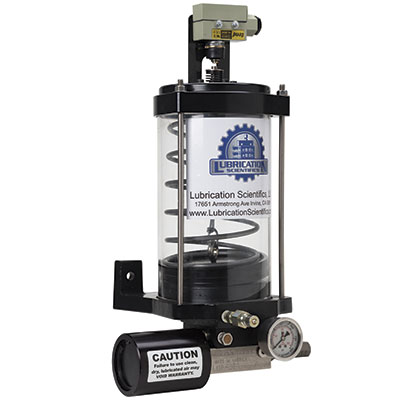In this conclusion, we detail three of the most common lubrication systems pump users rely upon: the Single-Line Parallel, which is also referred to as the Injector-type of lubrication delivery methodology; the Dual-Line Parallel, which is also easy to install and features adjustable metering valves; and the Single-Line Progressive System (or the Divider Valve System), which is precisely engineered to deliver exact lubricant requirements to each point.

THREE COMMON LUBRICATION SYSTEMS
One of the most common lubrication systems is the Single-Line Parallel, which is also referred to as the Injector-type of lubrication delivery methodology. This system is known for its ease of installation, adjustable metering of valves (or injectors) and applicability to a minimum of one and maximum of six lube points per device. Lubrication points may be added or removed without redesign of the system. On the down side, it is difficult to verify that each lubrication point is constantly being serviced.
Another common system is the Dual-Line Parallel. This system is also easy to install and features adjustable metering valves. With this type of system a minimum of one and maximum of eight lube points may be serviced from each device, and lubrication points may be added or subtracted without system redesign. Also, heavy greases may be delivered over very long distances. However, with this system it is difficult to verify that each lubrication point is constantly being serviced.
A third type of automated system, the Single-Line Progressive System (aka the Divider Valve System), is precisely engineered to deliver exact lubricant requirements to each point. However, with this system lubrication amounts and points may not be altered, and initial installation costs are higher than with other systems. A primary advantage of these systems is that system performance can be easily and inexpensively monitored to verify that each lube point is constantly being serviced.
In order to overcome the various threats of corrosive and caustic environments, Lubrication Scientifics makes all three types of system and components available in 303 and 316 stainless steel, most of which are available within days rather than months.

VERIFIABLE SYSTEM ADVANTAGES
Plants that have the verifiable automated system normally have the need to deliver precise amounts of lubrication to many points. This requirement is so stringent that is critical that workers could not normally adjust the amount or type of lubricant that being delivered to the equipment.
The biggest advantage of the Single-Line Progressive type of system is that every lubrication point is monitored, ensuring that each point is receiving the proper lubrication, thereby maximizing production uptime.
In addition, this type of system prevents unauthorized interference with system settings, so that workers cannot inadvertently change the precise amounts and intervals of lubrication sent to various points.

AVOIDING FAILURE OF METERING VALVES
Pulp and paper industry plants are exposed to some of the harshest environmental factors, including the wash-down procedures that occur at frequent intervals.
Corrosive damage from exposure to caustic emulsions and wash-down fluids can severely compromise the performance and service life of lubricating system metering valves. These are often constructed of zinc- or nickel-plated carbon steel.
In such an environment, the corrosion resistant life of a plated carbon steel metering valve or system component will only be weeks to months. Although the initial corrosion will look much like rust, it will eventually cause the lubrication metering valve to lose its effectiveness long before normal wear and tear would compromise that part.
One answer to preventing corrosion damage is the use of stainless steel. However, as a broad offering of stainless steel metering valves has not been readily available, the only effective anti-corrosion solution for automatic lubrication system components has been to enclose the plated carbon steel metering valves into stainless steel enclosures. Including the cost of the enclosure, the bulkhead fittings, and the installation labor, it is easy to spend $2,000 to protect a $500 plated carbon steel metering valve.

THE ANSWER TO THE PROBLEM
Rather than wasting precious capital enclosing carbon steel metering devices in stainless steel enclosures, Lubrication Scientifics produces and stocks stainless steel metering devices and accessories, for every type of lubrication delivery system. The company has a full offering of metering devices, specifically designed to meet the reliability and cost needs of the paper and pulp industry. These metering devices can be directly mounted onto the equipment being lubricated and all critical points can be economically monitored. If paper and pulp is your business, and corrosion and improper lubrication are hurting your bottom line, stainless steel lubrication systems are the answer to the problem. ◆
For More Information:
Richard Hanley is president of Lubrication Scientifics of Irvine, California. Lubrication Scientifics is an ISO 9001:2008 registered American manufacturer of automatic lubrication systems and system components. Its world class CNC manufacturing plant produces a full line of lubrication pumps, distribution valves, injectors, control devices, and system accessories. For more information, call 877.452.0157, email sales@lubricationscientifics.com, or visit www.lubricationscientifics.com.
____________________________________________
MODERN PUMPING TODAY, October 2016
Did you enjoy this article?
Subscribe to the FREE Digital Edition of Modern Pumping Today Magazine!
![]()


